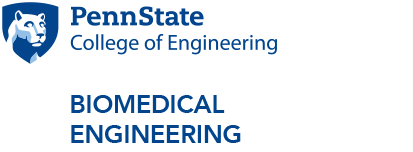MCAT Preparation
Approximately 25 to 30 percent of biomedical engineering graduates pursue a health professions degree. The Penn State Eberly College of Science’s Health Professions Advising Office is an additional resource for information about the application process.
Students should plan to take the MCAT by the end of their junior year. About 60 percent of Penn State students take prep courses (Kaplan or Princeton Review), however, this is the student’s decision. Students can do well without taking these courses, although some people like the structure of the courses.
It is highly recommended that you review the AAMC Preview Guide for the MCAT Exam, available free at the Association of American Medical Colleges website.
Coursework Preparation for the MCAT
The basic course requirements for medical school are one year (8 credits) each of: physics, chemistry, organic chemistry, biochemistry, biology, social sciences, and ethics. In addition to general course studies, most medical schools require one full year of each of the following (with appropriate labs):
Physics
- PHYS 211 – General Physics: Mechanics (4)
- PHYS 212 – General Physics: Electricity and Magnetism (4)
- PHYS 213 – General Physics: Fluids and Thermal Physics (2)
- PHYS 214 – General Physics: Wave Motion and Quantum Physics (2)
Inorganic Chemistry
- CHEM 110 – Chemical Principles I (3)
- CHEM 111 – Experimental Chemistry I (1)
- CHEM 112 – Chemical Principles II (3)
- CHEM 113 – Experimental Chemistry II (1)
Organic Chemistry
- CHEM 210 – Organic Chemistry I (3)
- CHEM 212 – Organic Chemistry II (3)
- CHEM 213 – Laboratory in Organic Chemistry (2)
Biology
- BIOL 110 – Biology: Basic Concepts and Biodiversity (4)
- BIOL 240W – Biology: Function and Development of Organisms (4)
- BIOL 141 – Introductory Physiology (3)
- BIOL 142 – Physiology Laboratory (1)
Additional Courses
In addition, the revised MCAT will test competency areas and not just content from specific courses. It is expected that these additional courses will be necessary to be prepared for the MCAT. These course include:
- PYSCH 100 – Introductory Psychology (3) – required
- SOC 001 – Introductory Sociology (3) – required
- PHIL 132 – Introduction to Bioethics (3) – required
- BMB 401 – Numerical Simulations in Biomedical Engineering (3) – required
- HIST 124 – History of Western Medicine (3) – recommended
- NUTR 251 – Introductory Principals of Nutrition (3) – recommended
Be aware that each school has a specific set of course requirements and you should do some research to determine that you are working toward completing those. Increasingly, some schools are not accepting credit from AP tests and credit by exam is typically not accepted by medical schools.
You need to consider three things during your undergraduate career to prepare for medical school:
- You need to complete the course requirements that medical schools expect to see on your transcript. There are general guidelines, but there is variation between schools. Also, you need to do this while keeping your GPA as high as possible.
- You need to prepare yourself for taking the MCAT, through both course work and individual study.
- You need to develop your résumé to demonstrate significant clinical experience and make yourself stand apart from the thousands of other applications.
Working in the Health Care System
To apply to medical school, you need experience working in the health care profession and demonstrate that you like to work with sick people and understand the rigors of clinical medicine. There are a number of ways to get this experience, including volunteering at a hospital, rehab center or nursing home, completing EMT training (available as a Penn State class), shadowing a doctor at a hospital or clinic, etc. This is a critical experience necessary for medical school application.
Laboratory Research
Having experience in a research laboratory on campus or elsewhere strengthens your application package and provides depth for your biomedical engineering coursework. If possible, try to work in a lab (for credit, for pay, or simply volunteering) to gain experience and learn how research is performed.
Extracurricular Activities and Minors
To be a strong applicant to medical school, it is good to have at least one extracurricular activity that you have done well. This can be a hobby, a volunteering experience (e.g., THON), being an officer in a club/organization, or many other options. Stress depth and leadership in an activity rather than spreading yourself thin across many small activities or clubs.
Having a second minor in engineering or science, while not bad, is not that important to medical school admissions boards. However, a second minor away from your major (e.g., in a Liberal Arts or Humanities) shows you are a well rounded student
Final Notes
To prepare yourself for medical school, you need to organize your coursework and try to have a college experience that provides a well rounded education and training for working in health care. Don’t try to do everything, do a few things well. Also, if you want to go abroad, add a minor, do a co-op, or engage in another experience that adds richness to your college experience but takes time, consider staying for an extra semester or year if your financial situation permits. There are some experiences that you can only get in college, and medical schools tend to look favorably on more mature students who have taken the time to pursue deep experiences during their college years.
For more details on the specifics of the MCAT and medical school applications, consult Premedicine @ Penn State, AMCAS Yearly Admissions Guide, or visit the Health Professions Advising Office.



